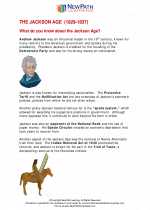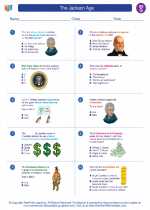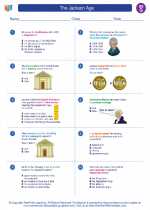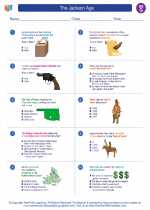The Jackson Age
Andrew Jackson was an influential leader in the 19th century, known for many reforms to the American government and society during his presidency. President Jackson is credited for the founding of the Democratic Party. Read More...
◂Social Studies Worksheets and Study Guides Seventh Grade. The Jackson Age
Study Guide The Jackson Age
The Jackson Age  Worksheet/Answer key
Worksheet/Answer key The Jackson Age
The Jackson Age  Worksheet/Answer key
Worksheet/Answer key The Jackson Age
The Jackson Age  Worksheet/Answer key
Worksheet/Answer key The Jackson Age
The Jackson Age 

 Worksheet/Answer key
Worksheet/Answer key
 Worksheet/Answer key
Worksheet/Answer key
 Worksheet/Answer key
Worksheet/Answer key

The resources above cover the following skills:
National Standards for Civics and Government (NSCG)
What are the foundations of the American political system? What are the distinctive characteristics of American society?
Diversity in American society. Students should be able to evaluate, take, and defend positions on the value and challenges of diversity in American life. To achieve this standard, students should be able to
Explain why conflicts have arisen from diversity, using historical and contemporary examples, e.g., North/South conflict; conflict about land, suffrage, and other rights of Native Americans; Catholic/Protestant conflicts in the nineteenth century; conflict about civil rights of minorities and women; present day ethnic conflict in urban settings
How does the government established by the constitution embody the purposes, values, and principles of American democracy? What does the national government do?
Major responsibilities for domestic and foreign policy. Students should be able to explain the major responsibilities of the national government for domestic and foreign policy. To achieve this standard, students should be able to
Identify historical and contemporary examples of important domestic policies, e.g., Pure Food and Drug Act, Environmental Protection Act, civil rights laws, child labor laws, minimum wage laws, Aid to Families with Dependent Children, Social Security
Explain how and why domestic policies affect their lives
How does the government established by the constitution embody the purposes, values, and principles of American democracy? How does the American political system provide for choice and opportunities for participation?
Forming and carrying out public policy. Students should be able to explain how public policy is formed and carried out at local, state, and national levels and what roles individuals can play in the process. To achieve this standard, students should be able to
Define public policy and identify examples at local, state, and national levels
National Center for History in Schools (NCHS)
Historical Thinking Standards
Historical Comprehension
Reconstruct the literal meaning of a historical passage.
United States History Content Standards
Era 4: Expansion and Reform (1801-1861)
United States territorial expansion between 1801 and 1861, and how it affected relations with external powers and Native Americans.
The student understands federal and state Indian policy and the strategies for survival forged by Native Americans.
The extension, restriction, and reorganization of political democracy after 1800.
The student understands the changing character of American political life in "the age of the common man."
Era 10: Contemporary United States (1968 to the present)
Recent developments in foreign and domestic politics.
The student understands domestic politics in contemporary society.